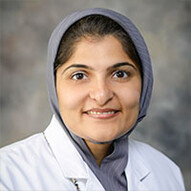Pediatric hyperaldosteronism
Pediatric hyperaldosteronism (hy·per·al·do·ste·ron·ism) is when the body makes too much aldosterone (al·do·ste·rone).
What is pediatric hyperaldosteronism?
Hyperaldosteronism is when the body makes too much aldosterone. Aldosterone (the outer layer of the adrenal gland) is important in keeping sodium and potassium levels in balance, which controls blood pressure and fluids in the blood.
What are the signs and symptoms of pediatric hyperaldosteronism?
Frequent urination (especially at night)
Generalized weakness
Muscle cramping
How is pediatric hyperaldosteronism diagnosed?
When hyperaldosteronism is being considered, your child’s doctor may order blood or urine tests to check for too much aldosterone and too little potassium. The physician will also perhaps order a CT scan to look for noncancerous tumors or other abnormal growths on the adrenal glands.
How is pediatric hyperaldosteronism treated?
Medications that block the effect of aldosterone are the main treatment for hyperaldosteronism. If there is a noncancerous tumor on only one adrenal gland, surgery to remove that tumor is often effective.
Pediatric hyperaldosteronism doctors and providers
 Perrin White, MDPediatric Endocrinologist
Perrin White, MDPediatric Endocrinologist Soumya Adhikari, MDPediatric Endocrinologist
Soumya Adhikari, MDPediatric Endocrinologist Abha Choudhary, MDPediatric Endocrinologist
Abha Choudhary, MDPediatric Endocrinologist Melissa Ham, MDPediatric Endocrinologist
Melissa Ham, MDPediatric Endocrinologist Huay-Lin Lo, MDPediatric Endocrinologist
Huay-Lin Lo, MDPediatric Endocrinologist Muniza Mogri, MDPediatric Endocrinologist
Muniza Mogri, MDPediatric Endocrinologist Nivedita Patni, MDPediatric Endocrinologist
Nivedita Patni, MDPediatric Endocrinologist Amanda Shaw, MDPediatric Endocrinologist
Amanda Shaw, MDPediatric Endocrinologist Ming Yang, MDPediatric Endocrinologist
Ming Yang, MDPediatric Endocrinologist